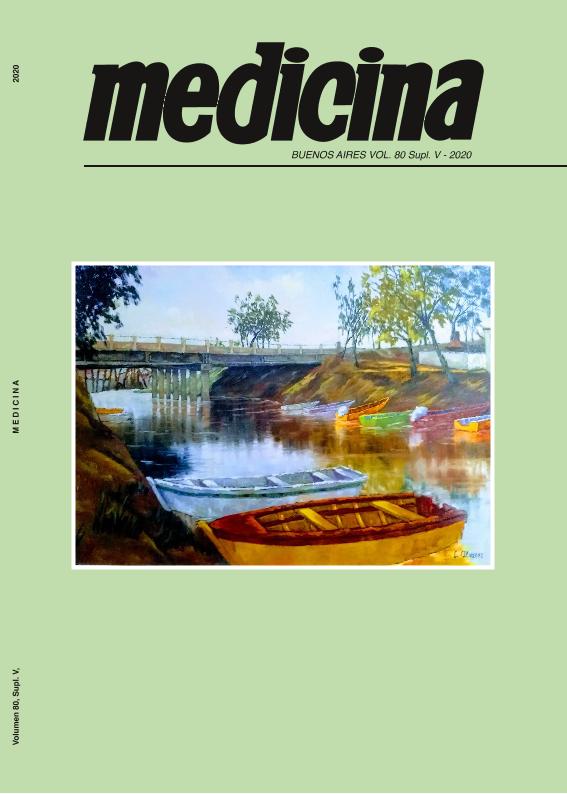Mostrar el registro sencillo del ítem
dc.contributor.author
del Balzo, Diego Damián

dc.contributor.author
Capmany, Anahi

dc.contributor.author
Cebrián, José Ignacio

dc.contributor.author
Damiani, María Teresa
dc.date.available
2023-05-31T19:47:26Z
dc.date.issued
2020
dc.identifier.citation
Chlamydia trachomatis disturbs antigen cross-presentation by infected dendritic cells; LXV Reunión Anual de la Sociedad Argentina de Investigación Clínica; LXVIII Reunión Anual de Ia Sociedad Argentina de Inmunología y Reunión Anual de la Sociedad Argentina de Fisiología; Buenos Aires; Argentina; 2020; 167-167
dc.identifier.issn
0025-7680
dc.identifier.uri
http://hdl.handle.net/11336/199248
dc.description.abstract
Chlamydia trachomatis (CT) is an obligate intracellular pathogen and the leading bacterial sexually transmitted infection worldwide. Inside the cell, CT lives into a parasitophorous vacuole (inclusion). Recently DC has begun to be studied like a CT host. Dendritic cells (DCs) can cross-present exogenous antigens to T CD8+ lymphocytes, a process that requires several intracellular transport pathways. Knowing that CT perturbs the intracellular transport, we hypothesized that chlamydia may alter antigen cross-presentation by disturbing key intracellular transport events. By using the DC line JAWS-II and the CT serovar L2, wee observed that CT evades most of the interaction with the endocytic pathway since CT does not localize to specific markers of early endosomes, lysosomes or multivesicular bodies. However, CT did showed a strong interaction with the recycling pathway marker TfR or with different Rab proteins that control endocytic recycling. . Also by confocal microscopy we evidenced a striking redistribution of MHC-I molecules in CT infected DCs. These cells lost their typical MHC-I location in both, the perinuclear recycling center and the plasma membrane. By flow cytometry and WB analysis, we confirmed that MHC-I molecules do not transport properly to the cell surface in infected DCs, as compared to uninfected cells. Although the total amounts of MHC-I molecules are similar in both conditions. . By using the model antigen ovalbumin (OVA) and the specific CD8+ T lymphocytes (B3Z) to measure cross-presentation, we found a significant decrease in the cross-presentation ability of infected DCs with both, soluble and latex beads-associated OVA. Finally, we discarded that this effect is caused by loss of endocytic capacity in the infected DC, since the endocytosis rate remained unchanged after chlamydia infection. Altogether these results indicate that CT infection alters the normal MHC-I intracellular distribution and impairs antigen cross-presentation by DCs.
dc.format
application/pdf
dc.language.iso
eng
dc.publisher
Fundación Revista Medicina
dc.rights
info:eu-repo/semantics/openAccess
dc.rights.uri
https://creativecommons.org/licenses/by-nc-sa/2.5/ar/
dc.subject
CHLAMYDIA TRACHOMATIS
dc.subject
CROSS-PRESENTATION
dc.subject
MHC-I
dc.subject.classification
Biología Celular, Microbiología

dc.subject.classification
Ciencias Biológicas

dc.subject.classification
CIENCIAS NATURALES Y EXACTAS

dc.title
Chlamydia trachomatis disturbs antigen cross-presentation by infected dendritic cells
dc.type
info:eu-repo/semantics/publishedVersion
dc.type
info:eu-repo/semantics/conferenceObject
dc.type
info:ar-repo/semantics/documento de conferencia
dc.date.updated
2022-11-04T15:12:05Z
dc.journal.volume
80
dc.journal.number
Suppl. 5
dc.journal.pagination
167-167
dc.journal.pais
Argentina

dc.journal.ciudad
Ciudad Autónoma de Buenos Aires
dc.description.fil
Fil: del Balzo, Diego Damián. Consejo Nacional de Investigaciones Científicas y Técnicas. Centro Científico Tecnológico Conicet - Mendoza. Instituto de Medicina y Biología Experimental de Cuyo; Argentina
dc.description.fil
Fil: Capmany, Anahi. Consejo Nacional de Investigaciones Científicas y Técnicas. Centro Científico Tecnológico Conicet - Mendoza. Instituto de Medicina y Biología Experimental de Cuyo; Argentina
dc.description.fil
Fil: Cebrián, José Ignacio. Consejo Nacional de Investigaciones Científicas y Técnicas. Centro Científico Tecnológico Conicet - Mendoza. Instituto de Histología y Embriología de Mendoza Dr. Mario H. Burgos. Universidad Nacional de Cuyo. Facultad de Ciencias Médicas. Instituto de Histología y Embriología de Mendoza Dr. Mario H. Burgos; Argentina
dc.description.fil
Fil: Damiani, María Teresa. Consejo Nacional de Investigaciones Científicas y Técnicas. Centro Científico Tecnológico Conicet - Mendoza. Instituto de Histología y Embriología de Mendoza Dr. Mario H. Burgos. Universidad Nacional de Cuyo. Facultad de Ciencias Médicas. Instituto de Histología y Embriología de Mendoza Dr. Mario H. Burgos; Argentina
dc.relation.alternativeid
info:eu-repo/semantics/altIdentifier/url/https://inmunologia.org.ar/reunion-anual-de-sociedades-de-biociencia-2020/
dc.conicet.rol
Autor

dc.conicet.rol
Autor

dc.conicet.rol
Autor

dc.conicet.rol
Autor

dc.coverage
Nacional
dc.type.subtype
Reunión
dc.description.nombreEvento
LXV Reunión Anual de la Sociedad Argentina de Investigación Clínica; LXVIII Reunión Anual de Ia Sociedad Argentina de Inmunología y Reunión Anual de la Sociedad Argentina de Fisiología
dc.date.evento
2020-11-10
dc.description.ciudadEvento
Buenos Aires
dc.description.paisEvento
Argentina

dc.type.publicacion
Journal
dc.description.institucionOrganizadora
Sociedad Argentina de Investigación Clínica
dc.description.institucionOrganizadora
Sociedad Argentina de Inmunología
dc.description.institucionOrganizadora
Sociedad Argentina De Fisiología
dc.source.revista
Medicina (Buenos Aires)

dc.date.eventoHasta
2020-11-13
dc.type
Reunión
Archivos asociados
